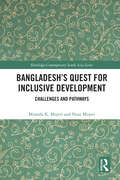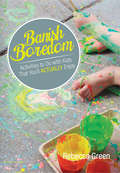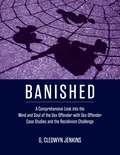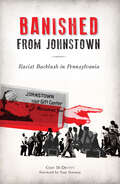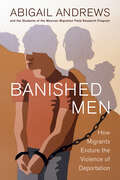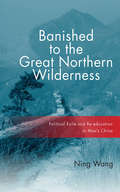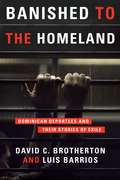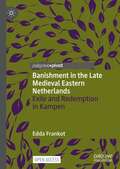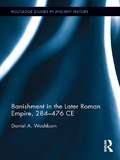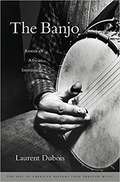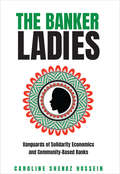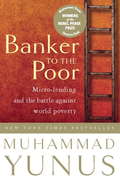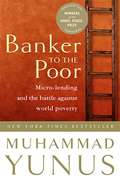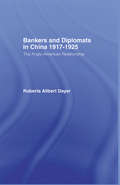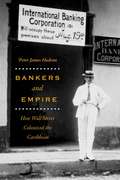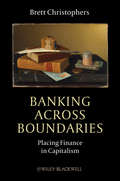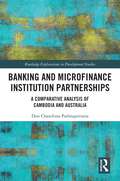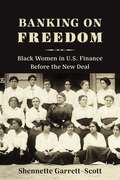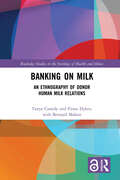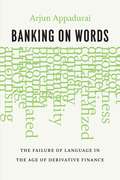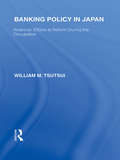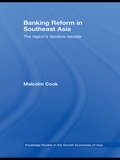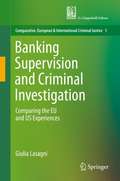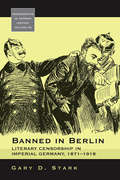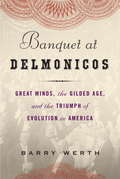- Table View
- List View
Bangladesh’s Quest for Inclusive Development: Challenges and Pathways (Routledge Contemporary South Asia Series)
by Mustafa K. Mujeri Neaz MujeriThe book provides a comprehensive conceptual understanding covering major challenges and pathways to progressively promote inclusive development in Bangladesh. Since independence in 1971, Bangladesh has achieved significant economic growth and social progress, but the benefits have not been shared equitably across all groups in society and there is the demand that inclusive development should be at the core of the country’s development agenda. Analysing inclusive development in Bangladesh, the authors present it as synonymous with improving the well-being of all individuals in a comprehensive manner along with upholding the principles of equity and justice. The book shows that the multi-dimensionality of inclusive development facilitates the participation of all in society in development through enhancing capabilities and ensuring equal opportunities. The analysis highlights social investments in specific concerns of the marginalised and disadvantaged groups and unequal structural forces that compel the state to remain biased towards the rich and consequent ‘elite capture’ of the state in Bangladesh. Arguing that Bangladesh has moved closer towards applying the inclusive development tenets in policy making, the book’s findings show that the challenge is the absence of any generic formula to ensure that the country is moving towards a more inclusive development path. A valuable contribution to the study of Bangladesh's changing dynamics of political, economic and social configurations and development economics, the book will be of interest to researchers in the fields of Economics, Asian Studies and Development Studies.
Banish Boredom: Activities to Do with Kids That You'll Actually Enjoy
by Rebecca GreenBased on her popular blog, Not-So-SAHM , Rebecca Green takes readers on an inspiring journey using beautiful color photos that she took of her children doing activities she describes in the book. Taking a lighthearted approach to the serious business of parenting, Banish Boredom helps parents find activities that they enjoy, while their children learn and have fun. Green suggests ways for parents to maintain their own identities and pursue their own interests while raising children who are creative, confident, and independent thinkers. Although it offers valuable tips to parents, this book is not a parenting book. Rather, it's a source of inspiration and new ideas for parents who are looking for fun and educational activities that they can do with their kids, but that are also fun and interesting for the parents themselves. The book emphasizes adapting activities to suit the particular interests of each child, while also taking into account the personality of the parent.
Banished: A Comprehensive Look into the Mind and Soul of the Sex Offender with Sex Offender Case Studies and the Recidivism Challenge
by Greg Cledwyn Jenkins, PhD, D.MinBanished presents a detailed review of the sex offender; the pedophile and the child molester, and directly explores his thinking processes, reasoning and related issues that offer a clear and concise exposé in these most hated people. In addition
Banished from Johnstown: Racist Backlash in Pennsylvania (American Heritage)
by Cody McDevittThis book examines one of the worst civil rights injustices in Pennsylvania history—the 1923 banishment of Black and Mexican residents from Johnstown. In response to the fatal shooting of four policemen in 1923, the mayor of Johnstown ordered every African American and Mexican immigrant who had lived in the city for less than seven years to leave. They were given less than a day to move or would face crippling fines or jail time. Many were forced out at gunpoint. An estimated two thousand people uprooted their lives in response to the racist edict. Area Ku Klux Klan members celebrated the creation of a &“sundown town&” and increased their own intimidation practices. Meanwhile, figures such as Marcus Garvey spoke out against the unjust action as newspapers throughout the country published condemnations. In Banished from Jonestown, historian and award-winning journalist Cody McDevitt examines the events and impact of one of the worst civil rights injustices in Western Pennsylvania history.
Banished Men: How Migrants Endure the Violence of Deportation
by Abigail Leslie AndrewsA free ebook version of this title is available through Luminos, University of California Press’s Open Access publishing program. Visit www.luminosoa.org to learn more. What becomes of men the U.S. locks up and kicks out? From 2009 to 2020, the U.S. deported more than five million people—over 90 percent of them men. In Banished Men, Abigail Andrews and her students tell 186 of their stories. How, they ask, does expulsion shape men's lives and sense of themselves? The book uncovers a harrowing carceral system that weaves together policing, prison, detention, removal, and border militarization to undermine migrants as men. Guards and gangs beat them down, till they feel like cockroaches, pigs, or dogs. Many lose ties with family. They do not go "home." Instead, they end up in limbo: stripped of their very humanity. Against the odds, they fight for new ways to belong. At once devastating and humane, Banished Men offers a clear-eyed critique of the violence of deportation.
Banished to the Great Northern Wilderness: Political Exile and Re-education in Mao’s China (Contemporary Chinese Studies)
by Ning WangAfter Mao Zedong’s Anti-Rightist Campaign of 1957–58, Chinese intellectuals were subjected to "re-education" by the state. In Banished to the Great Northern Wilderness, Ning Wang draws on labor farm archives, interviews, and memoirs to provide a remarkable look at the suffering and complex psychological world of these banished Beijing intellectuals. Wang’s use of newly uncovered Chinese-language sources challenges the concept of the intellectual as renegade martyr, showing how exiles often declared allegiance to the state for self-preservation. While Mao’s campaign victimized the banished, many of those same people also turned against their comrades. Wang describes the ways in which the state sought to remold the intellectuals, and he illuminates the strategies the exiles used to deal with camp officials and improve their chances of survival.
Banished to the Homeland: Dominican Deportees and Their Stories of Exile
by David C. Brotherton Luis BarriosThe 1996 U.S. Immigration Reform and Responsibility Act has led to the forcible deportation of tens of thousands of Dominicans from the United States. Following thousands of these individuals over a seven-year period, David C. Brotherton and Luis Barrios use a unique combination of sociological and criminological reasoning to isolate the forces that motivate emigrants to leave their homeland and then commit crimes in the Unites States violating the very terms of their stay. Housed in urban landscapes rife with gangs, drugs, and tenuous working conditions, these individuals, the authors find, repeatedly play out a tragic scenario, influenced by long-standing historical injustices, punitive politics, and increasingly conservative attitudes undermining basic human rights and freedoms. Brotherton and Barrios conclude that a simultaneous process of cultural inclusion and socioeconomic exclusion best explains the trajectory of emigration, settlement, and rejection, and they mark in the behavior of deportees the contradictory effects of dependency and colonialism: the seductive draw of capitalism typified by the American dream versus the material needs of immigrant life; the interests of an elite security state versus the desires of immigrant workers and families to succeed; and the ambitions of the Latino community versus the political realities of those designing crime and immigration laws, which disadvantage poor and vulnerable populations. Filled with riveting life stories and uncommon ethnographic research, this volume relates the modern deportee's journey to broader theoretical studies in transnationalism, assimilation, and social control.
Banishment in the Late Medieval Eastern Netherlands: Exile and Redemption in Kampen
by Edda FrankotThis open access book analyses the practice of banishment and what it can tell us about the values of late medieval society concerning morally acceptable behaviour. It focuses on the Dutch town of Kampen and considers the exclusion of offenders through banishment and the redemption of individuals after their exile. Banishment was a common punishment in late medieval Europe, especially for sexual offences. In Kampen it was also meted out as a consequence of the non-payment of fines, after which people could arrange repayment schemes which allowed them to return. The books firstly considers the legal context of the practice of banishment, before discussing punishment in Kampen more generally. In the third chapter the legal practice of banishment as a punitive and coercive measure is discussed. The final chapter focuses on the redemption of exiles, either because their punishment was completed, or because they arranged for the payment of outstanding fines.
Banishment in the Later Roman Empire, 284-476 CE (Routledge Studies in Ancient History #5)
by Daniel WashburnThis book offers a reconstruction and interpretation of banishment in the final era of a unified Roman Empire, 284-476 CE. Author Daniel Washburn argues that exile was both a penalty and a symbol. It applied to those who committed a misstep or crossed the wrong person; it also stood as a marker of affliction or failure. Like other punishments, it articulated and cemented the power asymmetry between the punisher and the punished. Distinctively, it maneuvered the body of the banished in order to tell that tale. The process of banishment also operated as a form of negotiation between the party that exiled and the one banished. In so doing, the punishment offered the possibility for pardon, an event that glorified the pardoner and signaled submissiveness on the part of the restored. In its sources, this work employs evidence from legal as well as literary materials to forge a complete picture of exile. To harvest all possible information from the period, it considers elements from the arenas of the early church and the Roman Empire. Methodologically, it situates ancient Christianity within the Roman world, while remaining sensitive to the distinct views and roles held by late antique bishops. While banishment played a major role in the history of the Later Empire, no work of scholarship has treated it as a topic in its own right.
The Banjo: America's African Instrument
by Laurent DuboisAmerican slaves drew on memories of African musical traditions to construct instruments from carved-out gourds covered with animal skin. Providing a sense of rootedness, solidarity, and consolation, banjo picking became an essential part of black plantation life, and its unmistakable sound remains versatile and enduring today, Laurent Dubois shows.
The Banker Ladies: Vanguards of Solidarity Economics and Community-Based Banks
by Caroline Shenaz HosseinAll over the world, Black and racialized women engage in the solidarity economy through what is known as mutual aid financing. Formally referred to as rotating savings and credit associations (ROSCAs), these institutions are purposefully informal to support the women’s livelihoods and social needs, and they act to reject tiered forms of neo-liberal development. The Banker Ladies – a term coined by women in the Black diaspora – are individuals that voluntarily organize ROSCAs for self-sufficiency and are intentional in their politicized economic co-operation to counter business exclusion. Caroline Shenaz Hossein reveals how Black women redefine the banking co-operative sector to be inclusive of informal institutions that are democratic and focused on group consensus, and which build an activist form of economic co-operation that is intent on making social profitability the norm. The book examines the ways in which diasporic Black women, who organize mutual aid, receive little to no attention. Unapologetically biased towards a group of women who have been purposely sidelined and put down for what they do, The Banker Ladies highlights how, in order to educate oneself about their contributions to politics and economics, it is imperative to listen to the voices of hundreds of Black women in charge of financial services for their communities.
Banker To The Poor: Micro-Lending and the Battle Against World Poverty
by Muhammad YunusMuhammad Yunus set up the Grameen Bank in his home country of Bangladesh with a loan of just u17, to lend tiny amounts of money to the poorest of the poor - those to whom no ordinary bank would lend. Most of his customers - as they still are - were illiterate women, wanting to set up the smallest imaginable village enterprises. It was his conviction that this new system of 'micro-credit', lending even such small sums, would give such people the spark of initiative needed to pull themselves out of poverty. Today, Yunus's system of micro-credit is practised around the world in some 60 countries, including the US, Canada and France. His Grameen Bank is now a billion-pound business. It is acknowledged by world leaders and by the World Bank to be a fundamental weapon in the fight against poverty. Banker to the Poor is Yunus's enthralling story of how he did it: how the terrible famine in Bangladesh in 1974 focused his ideas on the need to enable its victims to grow more food; how he overcame the sceptics in many governments and among traditional economic thinking; and how he saw his micro-credit extended even outside the Third World into credit unions in the West. Such is the importance of his book that HRH the Prince of Wales has contributed a Foreword in which he hails 'a remarkable man who] spoke the greatest good sense'. "
Banker to the Poor: Micro-lending and the Battle Against World Poverty
by Alan Jolis Muhammad YunusWinner of the Nobel Peace Prize describes how he founded Grameen Bank that is devoted to providing poor people with miniscule loans. The bank has provided 3.8 billion dollars to 2.4 million families in rural Bangladesh, enabling them to lift themselves out of poverty forever.
Bankers and Diplomats in China 1917-1925: The Anglo-American Relationship
by Roberta Allbert DayerFirst Published in 1981. Routledge is an imprint of Taylor & Francis, an informa company.
Bankers and Empire: How Wall Street Colonized the Caribbean
by Peter James HudsonFrom the end of the nineteenth century until the onset of the Great Depression, Wall Street embarked on a stunning, unprecedented, and often bloody period of international expansion in the Caribbean. A host of financial entities sought to control banking, trade, and finance in the region. In the process, they not only trampled local sovereignty, grappled with domestic banking regulation, and backed US imperialism—but they also set the model for bad behavior by banks, visible still today. In Bankers and Empire, Peter James Hudson tells the provocative story of this period, taking a close look at both the institutions and individuals who defined this era of American capitalism in the West Indies. Whether in Wall Street minstrel shows or in dubious practices across the Caribbean, the behavior of the banks was deeply conditioned by bankers’ racial views and prejudices. Drawing deeply on a broad range of sources, Hudson reveals that the banks’ experimental practices and projects in the Caribbean often led to embarrassing failure, and, eventually, literal erasure from the archives.
Banking Across Boundaries: Placing Finance in Capitalism (Antipode Book Series #16)
by Brett ChristophersThis compelling contribution to contemporary debates about the banking industry offers a unique perspective on its geographical and conceptual ‘placement’. It traces the evolving links between the two, revealing how our notions of banking ‘productiveness’ have evolved alongside the shifting loci of banking activity. An original contribution to the urgent debates taking place on banking sparked by the current economic crisis Offers a unique perspective on the geographical and social concept of ‘placement’ of the banking industry Combines theoretical approaches from political economy with contemporary literature on the performativity of economics Details the globalization of Western banking, and analyzes how representations of the banking sector’s productiveness have shifted throughout the evolution of Western economic theory Analyzes the social conceptualization of the nature – and value – of the banking industry Illuminates not only how economic ideas ‘perform’ and shape the economic world, but how those ideas are themselves always products of particular economic realities
Banking and Microfinance Institution Partnerships: A Comparative Analysis of Cambodia and Australia (Routledge Explorations in Development Studies)
by Don Chandima PadmaperumaThis book examines partnerships between commercial banks and microfinance institutions (MFIs). It demonstrates that when set up properly, these partnerships have the potential to develop and enhance the financial inclusion agenda, and further support sustainable development. MFIs provide access to finance predominantly for those who are poor but economically active, and therefore their expansion is imperative for inclusive economic development. However, MFIs are faced with enormous challenges. The book discusses how partnering with a commercial bank can meet these challenges and the process of interaction contributing to the enhancement of institutional robustness of MFIs. Through two distinct case studies, in Cambodia and Australia, the book discusses the motivations, objectives and operational dynamics of a partnership, as well as the challenges, success factors, and potential benefits, from the increase in outreach and sustainability, to the transference of knowledge and potential for capacity building. Similarly, the partnering banks benefit in line with the intended objectives–commercial or social besides help embedding social consciousness and improving staff engagement. Concluding with elucidating the characteristics of a partnership model that can succeed across different global contexts, the book will interest a range of researchers and students across development economics, banking, finance, and sustainable development.
Banking on Freedom: Black Women in U.S. Finance Before the New Deal (Columbia Studies in the History of U.S. Capitalism)
by Shennette Garrett-ScottBetween 1888 and 1930, African Americans opened more than a hundred banks and thousands of other financial institutions. In Banking on Freedom, Shennette Garrett-Scott explores this rich period of black financial innovation and its transformative impact on U.S. capitalism through the story of the St. Luke Bank in Richmond, Virginia: the first and only bank run by black women.Banking on Freedom offers an unparalleled account of how black women carved out economic, social, and political power in contexts shaped by sexism, white supremacy, and capitalist exploitation. Garrett-Scott chronicles both the bank’s success and the challenges this success wrought, including extralegal violence and aggressive oversight from state actors who saw black economic autonomy as a threat to both democratic capitalism and the social order. The teller cage and boardroom became sites of activism and resistance as the leadership of president Maggie Lena Walker and other women board members kept the bank grounded in meeting the needs of working-class black women. The first book to center black women’s engagement with the elite sectors of banking, finance, and insurance, Banking on Freedom reveals the ways gender, race, and class shaped the meanings of wealth and risk in U.S. capitalism and society.
Banking on Milk: An Ethnography of Donor Human Milk Relations
by Tanya Cassidy Fiona DykesBanking on Milk takes the reader on a journey through the everyday life of donor human milk banking across the United Kingdom (UK) and beyond, asking questions such as the following: Why do people decide to donate? How do parents of recipients hear about human milk? How does milk donation impact on lifestyle choices? Chapters record the practical everyday reality of work in a milk bank by drawing on extensive ethnographic observations and sensitive interview data from donors, mothers of recipients and the staff of four different milk banks from across the UK, and visits to milk banks across Europe and North America. It discusses the ongoing pressures to do with supply, demand and distribution. An empirically informed "ethnography of the contemporary", where both biosociality and biopower abound, this book includes an exploration of how milk banks evolved from registering wet nurses with hospitals, showing how a regulatory culture of medical authority began to quantify and organize human milk as a commodity. This book is a valuable read for all those with an interest in breastfeeding or organ and tissue donation from a range of fields, including midwifery, sociology, anthropology, geography, cultural studies and public health.
Banking on Words: The Failure of Language in the Age of Derivative Finance
by Arjun AppaduraiIn this provocative look at one of the most important events of our time, renowned scholar Arjun Appadurai argues that the economic collapse of 2008—while indeed spurred on by greed, ignorance, weak regulation, and irresponsible risk-taking—was, ultimately, a failure of language. To prove this sophisticated point, he takes us into the world of derivative finance, which has become the core of contemporary trading and the primary target of blame for the collapse and all our subsequent woes. With incisive argumentation, he analyzes this challengingly technical world, drawing on thinkers such as J. L. Austin, Marcel Mauss, and Max Weber as theoretical guides to showcase the ways language—and particular failures in it—paved the way for ruin. Appadurai moves in four steps through his analysis. In the first, he highlights the importance of derivatives in contemporary finance, isolating them as the core technical innovation that markets have produced. In the second, he shows that derivatives are essentially written contracts about the future prices of assets—they are, crucially, a promise. Drawing on Mauss’s The Gift and Austin’s theories on linguistic performatives, Appadurai, in his third step, shows how the derivative exploits the linguistic power of the promise through the special form that money takes in finance as the most abstract form of commodity value. Finally, he pinpoints one crucial feature of derivatives (as seen in the housing market especially): that they can make promises that other promises will be broken. He then details how this feature spread contagiously through the market, snowballing into the systemic liquidity crisis that we are all too familiar with now. With his characteristic clarity, Appadurai explains one of the most complicated—and yet absolutely central—aspects of our modern economy. He makes the critical link we have long needed to make: between the numerical force of money and the linguistic force of what we say we will do with it.
Banking Policy in Japan: American Efforts at Reform During the Occupation (Routledge Library Editions: Japan)
by William M TsutsuiThe unique Japanese banking system has contributed greatly to Japan’s post-war economic advance by investing aggressively in industry and by supporting close government-business relations. The banking sector might not have come to assume such a significant role, however, had American efforts to reform Japanese finance during the Occupation (1945-52) been successful. How Japan’s banking system maintained continuity of development and avoided the occupiers’ attempts at "democratisation" and "Americanisation" is the subject of this book. It explores why the Americans were committed to reform, the reasons they failed and how important the maintenance of the financial status quo was to the subsequent development of Japan’s "miracle" economy.
Banking Reform in Southeast Asia: The Region's Decisive Decade (Routledge Studies In The Growth Economies Of Asia Ser. #Vol. 83)
by Malcolm CookThis book empirically examines banking reform in the economies of Southeast Asia as they sought to adapt to major developments in the global economic system over the past three decades, including the globalisation of finance, the debt crisis of the 1980s and the 1997-1998 Asian financial crisis. Focusing in particular on the turbulent decade of fin
Banking Supervision and Criminal Investigation: Comparing the EU and US Experiences (Comparative, European and International Criminal Justice #1)
by Giulia LasagniIn the aftermath of the last financial crisis, on both sides of the Atlantic banking supervisors were given new supervisory and enforcement powers, which are often of a substantially punitive-criminal nature. In Europe in particular, the establishment of the Single Supervisory Mechanism within the European Central Bank substantially increased centralised investigatory and sanctioning powers. This major innovation, together with the development of forms of real-time monitoring of banking (often digital) records, challenges traditional banking criminal investigations in their national-based and analogue dimension.The book offers a comprehensive account and perspective analysis of the interactions between the criminal and administrative nature of such new powers, highlighting their “punitive” overall nature and their impact on fundamental rights. Covering both the US and the EU regulatory frameworks, it presents unprecedented, trans-systemic research between criminal law and procedure, and between regulatory and administrative law, at the international, European and national level.The book also includes a rich and detailed selection of case law from the US and the European supreme courts, with a specific focus on CJEU and ECtHR decisions.
Banned In Berlin
by Gary D. StarkImperial Germany's governing elite frequently sought to censor literature that threatened established political, social, religious, and moral norms in the name of public peace, order, and security. It claimed and exercised a prerogative to intervene in literary life that was broader than that of its Western neighbors, but still not broad enough to prevent the literary community from challenging and subverting many of the social norms the state was most determined to defend. This study is the first systematic analysis in any language of state censorship of literature and theater in imperial Germany (1871-1918). To assess the role that formal state controls played in German literary and political life during this period, it examines the intent, function, contested legal basis, institutions, and everyday operations of literary censorship as well as its effectiveness and its impact on authors, publishers, and theater directors.
Banquet at Delmonico's
by Barry WerthIn Banquet at Delmonico's, Barry Werth, the acclaimed author of The Scarlet Professor, draws readers inside the circle of philosophers, scientists, politicians, businessmen, clergymen, and scholars who brought Charles Darwin's controversial ideas to America in the crucial years after the Civil War.The United States in the 1870s and '80s was deep in turmoil-a brash young nation torn by a great depression, mired in scandal and corruption, rocked by crises in government, violently conflicted over science and race, and fired up by spiritual and sexual upheavals. Secularism was rising, most notably in academia. Evolution-and its catchphrase, "survival of the fittest"-animated and guided this Gilded Age.Darwin's theory of natural selection was extended to society and morals not by Darwin himself but by the English philosopher Herbert Spencer, father of "the Law of Equal Freedom," which holds that "every man is free to do that which he wills," provided it doesn't infringe on the equal freedom of others. As this justification took root as a social, economic, and ethical doctrine, Spencer won numerous influential American disciples and allies, including industrialist Andrew Carnegie, clergyman Henry Ward Beecher, and political reformer Carl Schurz. Churches, campuses, and newspapers convulsed with debate over the proper role of government in regulating Americans' behavior, this country's place among nations, and, most explosively, the question of God's existence.In late 1882, most of the main figures who brought about and popularized these developments gathered at Delmonico's, New York's most venerable restaurant, in an exclusive farewell dinner to honor Spencer and to toast the social applications of the theory of evolution. It was a historic celebration from which the repercussions still ripple throughout our society.Banquet at Delmonico's is social history at its finest, richest, and most appetizing, a brilliant narrative bristling with personal intrigue, tantalizing insights, and greater truths about American life and culture.From the Hardcover edition.
